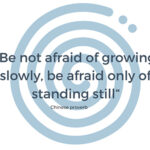| February 2022 |
IS THIS THE YEAR TO GROW?

Are you taking advantage of a growth mindset mentality?
WRITTEN BY: Michelle White
The New York Times, Grammarly and many other references listed the “most common or annoying phrases for…” 2020 and 2021. Many of the words obviously related to the pandemic with some funnies emerging such as quarantini, doomscrolling, virtual happy hour etc.
Business buzzwords taking centre stage were circuit breaker, zoom, pivot, new normal, hybrid work, great resignation, languishing, think outside the box, synergy, unprecedented, high-performance team….
For 2022 the standout lingo seems to be, amongst others: AI, thought leadership, sustainable and resilient operations, agile, authenticity, cooperation, purposeful business, integration etc.
One pronounced concept we have been hearing is growth mindset (Carol Dweck) or Infinite mindset (Simon Sinek) which is exciting news! The prospect of businesses and individuals focussing on moving forward and developing and growing is certainly positive and exciting.
So interestingly, Carol Dweck, Lewis and Virginia Eaton Professor of Psychology at Stanford University, and one of the world’s leading researchers on motivation and mindsets published a book in 2007 on her growth vs. fixed mindset theory titled: Mindset – The New Psychology of Success. In this book, “Dweck describes the importance of having the right mindset to maximise our potential and capitalize on our strengths”.
Dweck writes, “In the fixed mindset, everything is about the outcome. If you fail—or if you’re not the best—it’s all been wasted”. “The growth mindset allows people to value what they’re doing regardless of the outcome. They’re tackling problems, charting new courses, working on important issues. Individuals who believe their talents can be developed (through hard work, good strategies, and input from others) have a growth mindset. They tend to achieve more than those with a more fixed mindset (those who believe their talents are innate gifts).”
After studying the behaviour of thousands of children, Dr. Dweck coined the terms fixed mindset and growth mindset to describe the underlying beliefs people have about learning and intelligence. When students believe they can get smarter, they understand that effort makes them stronger.
This opens opportunities for all of us and before we get stuck into the year, consider how to leverage this continuous learning mentality. A few suggestions:
“Be not afraid of growing slowly, be afraid of standing still” – Chinese proverb”
“INDIVIDUALS WHO BELIEVE THEIR TALENTS CAN BE DEVELOPED (THROUGH HARD WORK, GOOD STRATEGIES, AND INPUT FROM OTHERS) HAVE A GROWTH MINDSET.”
1. Intentionally set some personal goals with a focus on learning and developing a new skill.
2. Talk to your leadership about supporting your professional development such as leadership skills, further studies or joining collaborative business community groups.
3. Map the technical skills or business skills you want to develop over the next 12-18 months.
4. Allow time for self-learning as part of your job.
5. Actively research programs to support your career development plan.
6. Select programs that are recognised and will add value when you apply for the next level role.
7. Focus on learning support, as part of your decision to take on a new role in a company and investigate the investment the company is prepared to make in your professional development.
8. Include learning into your Professional Development Plan.
9. Negotiate financial assistance as part of your remuneration package for your career development.
10. Engage a career coach or mentor internally in your company or externally to provide objective guidance.
With technology and business models rapidly changing a growth mindset is critical to remain competitive, in demand and craft a successful career.











